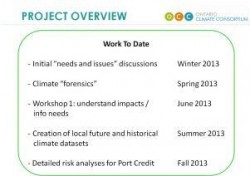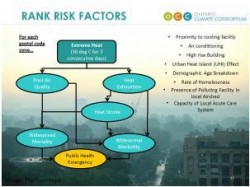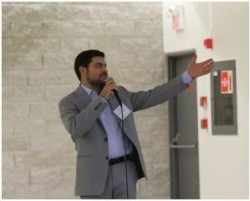November 30, 2013
Climate Change Risk Assessment in the Region of Peel
 On November 26, 2013, the OCC and TRCA hosted a two-part workshop focused on a current climate change risks assessment (RA) pilot currently underway in Port Credit and a forthcoming project focused on climate change (RA) with a specific focus on natural heritage.
On November 26, 2013, the OCC and TRCA hosted a two-part workshop focused on a current climate change risks assessment (RA) pilot currently underway in Port Credit and a forthcoming project focused on climate change (RA) with a specific focus on natural heritage.
 The purpose of the morning session was to review the work that been completed as part of the Port Credit RA to date and to discuss adaptation recommendations based on the preliminary results. At the last workshop, the climate-related impacts of concern for Port Credit and the key system response thresholds were identified through facilitated discussions.
The purpose of the morning session was to review the work that been completed as part of the Port Credit RA to date and to discuss adaptation recommendations based on the preliminary results. At the last workshop, the climate-related impacts of concern for Port Credit and the key system response thresholds were identified through facilitated discussions.
 In the morning attendees heard from Harris Switzman (pictured right) from the TRCA who provided an update on the status of the Port Credit RA. Following on Harris’ presentation of the results from the initial risk assessment, participants had the opportunity to hear from expert speakers from Environment Canada and the Credit Valley Conservation Authority with regard to various issues associated with climate change vulnerability and adaptation in the region. Presenters included Frank Seglenieks from Environment Canada who spoke about hydroclimatological changes in the context of the Great Lakes as well as the downscaling of regional climate models. Wendy Leger from Environment Canada spoke about the adaptive management plan being used to address extreme weather levels for the Great Lakes and St. Lawrence River. Other speakers included Dan Banks and Christine Zimmer from Credit Valley Conservation (CVC) who spoke about how the changes in weather and climate are affecting flood risk and vulnerability, but also potential solutions associated with low impact development (LID) projects and their role in effectively reducing surface flooding.
In the morning attendees heard from Harris Switzman (pictured right) from the TRCA who provided an update on the status of the Port Credit RA. Following on Harris’ presentation of the results from the initial risk assessment, participants had the opportunity to hear from expert speakers from Environment Canada and the Credit Valley Conservation Authority with regard to various issues associated with climate change vulnerability and adaptation in the region. Presenters included Frank Seglenieks from Environment Canada who spoke about hydroclimatological changes in the context of the Great Lakes as well as the downscaling of regional climate models. Wendy Leger from Environment Canada spoke about the adaptive management plan being used to address extreme weather levels for the Great Lakes and St. Lawrence River. Other speakers included Dan Banks and Christine Zimmer from Credit Valley Conservation (CVC) who spoke about how the changes in weather and climate are affecting flood risk and vulnerability, but also potential solutions associated with low impact development (LID) projects and their role in effectively reducing surface flooding.
Following the presentations participants had the opportunity to explore the RA process by working through some key examples. I was part of a group focused on understanding the impacts of extreme heat on vulnerable people. The scenario we considered focused on extreme heat (30 degrees C for 3 consecutive days) and how this could lead to a public health emergency. The thresholds of concern were determined from discussions at the first Port Credit workshop and through research conducted by the project team. Based on the scenario before us, the group was able to identify some key risk factors associated with extreme heat impacts (for example, proximity to a cooling facility and access to air conditioning). This discussion naturally flowed into the different ways in which we can help reduce the impact that extreme heat has on these groups (for example, neighbourhood programs focused on checking up on vulnerable people).
In the afternoon, we switched gears slightly, while the focus was still on climate change RA, the discussion was concentrated on better understanding the impact of climate change on natural heritage. Building upon the findings from the pilots conducted in Port Credit and Caledon, TRCA and partners will be undertaking a detailed RA of natural heritage in the region. The purpose of this workshop was to determine the values that individuals associate with the natural world, how natural heritage impacts the day-to-day personal and professional lives of participants and the ways in which the existence of a healthier environment may ultimately make our personal and professional lives better. Key themes emerged through discussion with individuals through the room. When individuals were asked about what they associate with nature on a personal level, it was interesting how many people associated interactions with the natural world in terms of their connection to water, whether as children on the beaches of Lake Ontario or canoeing up the Credit River. On a professional level, many individuals noted that their jobs involve protecting the environment in one degree or another. Presentations from Ryan Ness (TRCA), Bob Morris (CVC) and Al Douglas (Ontario Centre for Climate Impacts and Adaptation Resources – OCCIAR) provided an excellent foundation for discussion throughout the afternoon and ultimately a better understanding of climate impacts to natural heritage in the Region and the province, but also opportunities to address those vulnerabilities.
 While climate change presents a range of challenges to a wide variety of systems at various scales, discussions of the ongoing work in Port Credit and the upcoming work on natural heritage revealed a tremendous interest in advancing efforts and initiatives aimed at adapting to the risks posed by a changing climate, and ultimately developing more resilient communities.
While climate change presents a range of challenges to a wide variety of systems at various scales, discussions of the ongoing work in Port Credit and the upcoming work on natural heritage revealed a tremendous interest in advancing efforts and initiatives aimed at adapting to the risks posed by a changing climate, and ultimately developing more resilient communities.
 Simran Chattha completed her B.E.S. degree at York University. More recently, she graduated from the University of Guelph with an M.A. in Political Science specializing in Public Policy and Administration. Her research interests lie in the areas of environmental policy and climate change adaptation.
Simran Chattha completed her B.E.S. degree at York University. More recently, she graduated from the University of Guelph with an M.A. in Political Science specializing in Public Policy and Administration. Her research interests lie in the areas of environmental policy and climate change adaptation.







Comments are closed here.